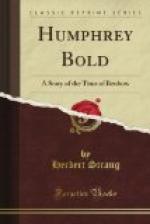Accordingly, next morning I suggested that we should ask the commandant to give us some planks of wood with which to make an instrument of a new model. The men were amused at the notion, never suspecting that I had any other design than to enrich the harmony of our ensemble. ’Twould be good fun, they agreed, though they had great doubt (as I had myself) whether our unskilled workmanship would produce anything but a useless monstrosity so far as music was concerned. They were willing to try, however, the attempt would help us to kill time; and the commandant proving perfectly agreeable to humor us, we gut the planks, borrowed some tools from the soldiers, and set to work.
The next following days saw half a dozen of us busily employed in the courtyard in knocking together a long shallow box, in the upper side of which we pierced S-shaped holes like those of the fiddle, with a notched bridge at about one-third of its length for holding four strings, and wooden screws at the other end for stretching them taut. Joe Punchard, good fellow, was the most ardent of the artificers, plying the tools with a dexterity born of his work for master cooper Matthew Mark years before. We got from the soldiers, who showed a great interest in our task, cords of different thickness, and several lengths of iron wire which we twisted together somewhat after the manner of the thickest string of the fiddle. We then stretched this and three cords over the bridge on the top of the box, screwed them to a high tension, and plucked them to see if they emitted notes that could be called musical.
The result surpassed my expectations. Tolliday, our fiddler, declared that the notes were true music, though to be sure not very resonant, and he undertook to tune the strings in fifths, so that it might be able to take a proper part in our next symphony. Having no bow with which to scrape the strings, he said that they could only be strummed with the finger and thumb, and when he offered to teach one of us thus to handle it, there were many candidates for the place, which in the end fell to a man named Winslow. The men were all mightily pleased with the success of our work, and I was secretly delighted, not with the instrument as a producer of music, but at knowing that we had a box which might serve those of us who could not swim as a raft.
We had now at command (if we could secretly purloin it) a rope to let us down, and a raft to ferry us over the moat, but we had still to find a means of getting beyond the wall, and to this I bent all my energy of mind. In this, too, I took Joe Punchard into consultation, and we discussed all kinds of plans. With the sentry on guard throughout the night in the courtyard there was no hope of escape by the gate and drawbridge. There was no opening in the wall. The only possible means of exit was to cut a hole in it, and this would be a matter of great toil, the wall being, as some one had told us, ten feet thick. It consisted, so far as we could tell from the inside, of solid blocks of stone cemented together, and when, at an odd moment when no one was looking, I tried to scrape away some of the cement between two of the stones, I found that it was almost as hard as the stone itself.




